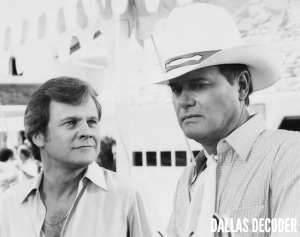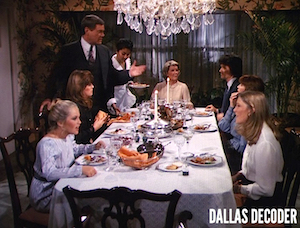
Lone star
Cliff Barnes was a loser, but Ken Kercheval was anything but. By portraying Cliff as an endearing jackass, Kercheval won the hearts of “Dallas” fans and created a character who, in some ways, was as essential to the show’s success as Larry Hagman’s J.R. Ewing. Cliff could be petty, foolish and hopelessly oblivious, but Kercheval brought so much humanity to the role, you couldn’t help but like the schmuck. Deep down, I bet some of us even rooted for him.
Kercheval’s death this week has unleashed a torrent of Cliff clips on social media, reminding everyone how good he was in his career-defining role. Talk about an actor with range! Cliff was the bumbling nemesis who prompted many of J.R.’s most memorable quips (“Oh Barnes, you just get dumber and dumber every day”) and the unlikely lothario who treated so many of the show’s leading ladies like Texas dirt, but he also was the wounded soul who sweetly reconciled with his runaway mama over a bowl of licorice; the protective big brother who knowingly winced when he heard the radio bulletin announcing that Pam’s true love Bobby had been mowed down in her driveway; the humbled avenger who sat on a park bench with Miss Ellie and sought forgiveness for waging war on her family. In the hands of a lesser actor, Cliff would have been just another soap opera character whose motivations changed with the wind. Kercheval made him real.
The true secret to Cliff’s appeal, though, lay in his rivalry with J.R. With the exception of Patrick Duffy and perhaps Hayden Rourke, did Larry Hagman ever have a better on-screen foil than Ken Kercheval? I couldn’t possibly pick a favorite scene between J.R. and Cliff, but their schoolyard showdown-style exchange of insults in the 1984 episode “And the Winner Is …” stands out. Kercheval and Hagman are fire and ice here: While Cliff rages (“You can’t stand the fact that Barnes-Wentworth is going to be bigger than Ewing ever dreamed of being!”), J.R. stands his ground, calmly burrowing ever deeper under Cliff’s skin (“You’re going to bankrupt your mama’s company and wind up just like your daddy: a drunk and a bum”). Despite all the bluster, Kercheval always injected a hint of envy into his performance, letting the audience see that Cliff didn’t want to beat J.R.; he wanted to be J.R. Once you realize that’s where Cliff is coming from, how can you not feel for the poor slob? After all, who among us doesn’t want to be J.R.?

Mutual admiration society
Truth be told, I think J.R. secretly admired Cliff’s tenacity, although like his character, Kercheval never got the respect he deserved. Despite being the show’s most delightfully unpredictable performer — you didn’t watch Ken Kercheval, you experienced him — he never scored an Emmy. (Neither did Hagman, but at least he got nominated.) Just as puzzlingly, Kercheval was in “Dallas” from the beginning and did as much as anyone to transform the show into a hit, yet he wasn’t promoted to the opening credits until the third season. Of course, once he finally showed up, the close-ups chosen for his three-way split screen captured the character in all his multi-faceted glory: Confused Cliff, Chipper Cliff, Crabby Cliff. Perfect.
Regardless, Kercheval ended up getting the last laugh. Besides Hagman, he was the only member of the cast to appear in all 14 seasons of the original series before going on to appear in the first reunion movie and all three seasons of TNT’s sequel series. Altogether, Kercheval logged 360 hours of “Dallas” across its various incarnations, second only to Hagman, who clocked more than 380 hours. And while Cliff never became an icon like J.R., Kercheval’s character made his mark in popular culture nonetheless. A Washington Post editorial once derided then-Vice President George H.W. Bush as “the Cliff Barnes of American politics — blustering, opportunistic, craven and hopelessly ineffective all at once” (ouch). Kercheval also deserves credit for making pocket squares seem so stylish in the 1980s — and is it possible his cheapskate character did more to popularize Chinese food in the American diet than Panda Express?
It’s been touching to see so many of Kercheval’s former cast mates honor him online this week, especially Audrey Landers, whose Afton Cooper did so much to humanize Cliff, and Julie Gonzalo, who holds the distinction of being the last “Dallas” actor to share a scene with Kercheval during the final season of the TNT series. Linda Gray, Charlene Tilton and both of Kercheval’s on-screen sisters, Victoria Principal and Morgan Brittany, also wrote nice things about him, along with Leigh McCloskey. As far as I can remember, McCloskey’s character, pretty-boy plastic surgeon Dr. Mitch Cooper, never shared a meaningful moment with Cliff, yet McCloskey penned a lovely tribute to Kercheval on Facebook, remembering how kind the actor was to him when he joined the cast. Everyone, it seems, had affection for “Kenny.”
Tributes like these are a reminder that while the rest of us have lost a favorite TV star, the cast members are mourning the death of an old friend. Kercheval somewhat famously used to say he never watched “Dallas” when it was on the air. As he explained when I interviewed him in 2012, once he played a scene in front of the cameras, he felt no compulsion to tune in on Friday night and watch it. But Kercheval also talked about how much he enjoyed working with actors like Gray, Landers and his close pal Barbara Bel Geddes, and he expressed amazement that people still recognized him as Cliff, even when he traveled abroad. I didn’t include this in the published interview, but I asked him if he thought it was strange that fans like me still obsess over “Dallas” after all these years. His matter-of-fact answer: “Yeah.” He added that he appreciated the fans and was thankful for their support, but in the end, the show was just a show. “I mean, you know, to me, it was just a job,” he said.
Fair enough. To him, maybe “Dallas” was just a job. But didn’t he do it well?
What are your favorite memories of Ken Kercheval on “Dallas”? Share your comments below and read more opinions from Dallas Decoder.





















